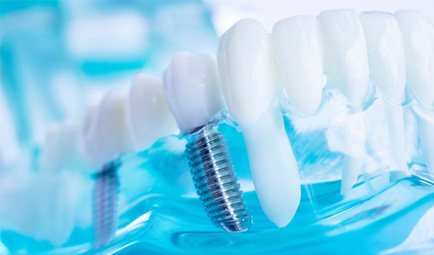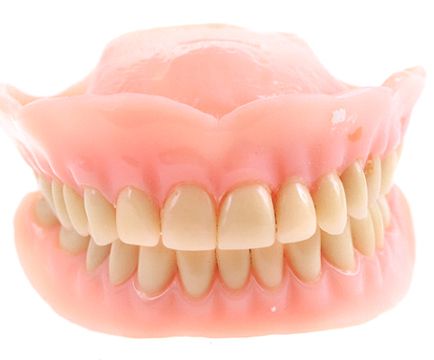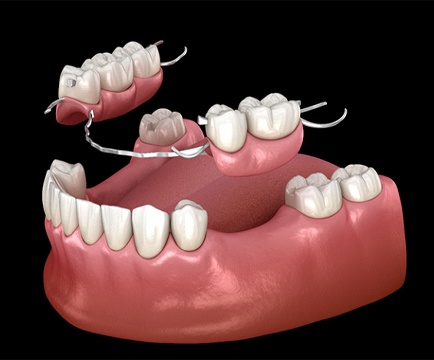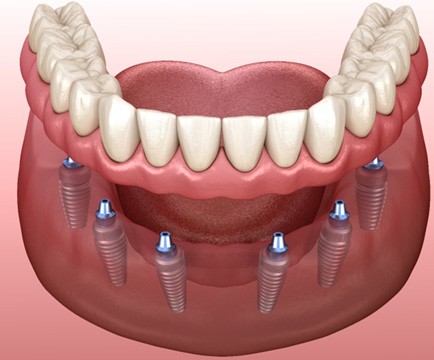One or two teeth in a row can be replaced with a dental bridge, but what if there are several gaps in your smile? Or what if an entire row of teeth is missing? If you want to restore your youthful facial appearance and regain your mouth’s normal functions, our team at Baltimore Dental Arts can provide you with partial and full dentures to refresh your grin. Contact us today to schedule an appointment with one of your trusted dental professionals and learn more about how dentures can help you get your confidence and the quality of your life back.
Who’s a Good Candidate for Dentures?

Those missing some or all of their teeth can likely benefit greatly from wearing dentures. These prosthetics are custom-made to fit your exact specifications, so you should expect a highly natural-looking and -feeling solution for rebuilding your smile. Our team will evaluate your oral health so that we can address any underlying issues before moving forward with your treatment. Until then, here’s what to consider when determining a good candidate for dentures.
Learn More
Effects of Missing Teeth

There are various reasons why you might experience tooth loss, including tooth decay, periodontal disease, and accidental injury. However, once you’ve lost some or all of your teeth, the appearance of your smile will only be one of the many complications you might experience. Some of the most common side effects of missing teeth involve trouble speaking, difficulty eating, jawbone deterioration, and low self-esteem. That’s what makes dentures one of the most reliable and convenient ways to rebuild your smile—you’ll be able to improve both your oral health and overall well-being by wearing them!
What Qualifies You for Dentures?

Almost all adults are eligible for dentures, whether they’re missing a single tooth or their entire arch of teeth. However, our team will need to ensure that your oral health is in good enough condition to receive your prosthetics. Not only will you need adequate jawbone and healthy gums to support your dentures, but you’ll also need to be committed to maintaining your brand-new smile with great oral hygiene. If we detect any developing complications in your mouth, such as gum disease, decay, or infection, then we’ll need to address these before going forth with the process.
Alternative Tooth-Replacement Options

Not everyone will be a good candidate for dentures, and that’s okay! The good news is that our team can offer alternative tooth-replacement treatments to help rebuild your missing teeth, depending on your unique situation. Two of the options we provide include:
- Dental Bridges: These restorations function by connecting two dental crowns with pontics (artificial teeth) to bridge the gap between missing teeth. The crowns will sit atop the adjacent natural teeth on either side of the space.
- Dental Implants: These titanium posts will be designed to remain in the jawbone itself instead of relying on the gums or other healthy teeth. Not only does this provide a more lifelike and stable structure for your new pearly whites, but you can also expect your results to last decades to a lifetime with proper maintenance.
Full Dentures

You probably are familiar with the full dentures that seniors often use to speak, smile, and chew after losing an entire arch of teeth. These restorations are made out of ceramic or acrylic teeth attached to a gum-colored base that blends in with the rest of your mouth. Your own dentures will be fully personalized by dental lab technicians working based on impressions of your mouth. Full dentures are held in place by natural suction, but you can use denture adhesive to stabilize them further. When full dentures are made for the top arch, they’ll cover the roof of the mouth; dentures for the bottom arch allow enough room for the tongue.
Partial Dentures

Partial dentures are designed to replace a specific number of teeth based on where the gaps in your smile. Think of them like a puzzle piece specially made to fit into the available space. Aside from that, they’re similar to full dentures in the materials used to craft them, and they also allow you to eat and speak normally after tooth loss. However, instead of relying on natural suction, partial dentures are typically held in place by metal clasps attached to the natural teeth.
The Benefits of Dentures

Today, there’s more than one way to address tooth loss head-on. If you’re currently in the process of deciding if dentures are right for you, then you might find this next section helpful! Below are a few of the many reasons this tooth-replacement solution continues to be popular year after year, decade after decade.
Learn More
Improved Confidence

When you lose multiple teeth at once, your facial muscles will collapse, and your jawbone will begin to deteriorate. As a result, your face will look sunken-in, making you look much older than you actually are. The good news is that your denture will be custom-made just for you, ensuring it looks and feels just like the real thing. In short, you can keep yourself looking younger for a longer period of time with dentures.
Clearer Enunciation

Since even a small gap between your teeth can make it difficult to enunciate clearly, you can imagine how difficult it is to communicate when there are several gaps throughout your smile. Fortunately, partial, full, and implant dentures can seamlessly replace anywhere from a few to an entire arch of missing teeth, restoring your normal speaking patterns in the process.
Better Nutrition

Simply put, those struggling with tooth loss often have no choice but to eat a limited diet consisting of bananas, oatmeal, yogurt, and applesauce. When fitted properly, dentures are stable enough to allow you to enjoy many of the foods you love again. In other words, with the right steps (such as cutting your food into small pieces before trying to chew it), you can enjoy a healthy diet with few restrictions with this popular tooth-replacement solution.
Preserves Oral Health

Did you know that leaving the space open following the loss of a tooth can lead to several oral health problems? One of them is dental drift, which has the potential to negatively impact both the alignment and strength of your bite. Fortunately, dentures can prevent that and several other dental issues from happening.
Cost-Effective

Compared to other forms of tooth replacement, dentures are highly affordable upfront. They usually are covered in part by dental insurance providers as well, which helps lower your out-of-pocket expenses even further.
Implant Dentures

Did you realize that dentures can be anchored to dental implants? With this type of restoration, your new teeth will be more stable and will stay in place at all times. You’ll never have to worry about teeth slipping while chewing or laughing. Also, the implant roots will stimulate the jawbone to keep it happy. Thanks to their durability, implant dentures can last for decades and often even last for the rest of a person’s life.
How Dentures Are Made

Many patients who suffer from tooth loss and are considering custom prosthetics are interested in learning how dentures are made. The process that is required to create these new teeth involves much time and attention, which is why our team at Baltimore Dental Arts is here to provide a more in-depth look at what is involved in the denture creation process. Once you learn how they’re made, you’ll develop a deeper appreciation for your new smile.
Learn More
What Are Dentures Made Of?

Dentures consist of two distinct parts: the base and artificial teeth that rest on top of the base. To better understand how they’re made, let’s take a closer look:
- The base of the denture is the foundational support for your new teeth. This is often made from acrylic materials that are color-matched to your existing gum shade. Other materials that can be used include nylon, porcelain, resin, or metal. Acrylic is often best for full dentures because of how it can mimic the natural color of your gum tissue. This same material is frequently used to craft partial dentures; however, these prosthetics require metal clasps to help hold them in place.
- The artificial teeth you have created for your new smile rest on top of the base to create a full, complete appearance. These teeth can be crafted using porcelain or resin because they provide a more natural look, but the former tends to be the most popular. Its durability and similarity to natural teeth make it a preferred option, but many dentists only use it when creating full dentures because porcelain can be highly abrasive.
The Denture Creation Process

There are multiple steps required to complete a customized denture. This ensures that each prosthetic is designed specifically with your unique needs and specifications in mind. For a more complete breakdown of the creation process, here is what you can expect:
- Your dentist will take impressions of your gums (upper and lower) so that a model is created. Also, measurements of your jaw will be captured.
- The cast of your gums will be sent to a laboratory for technicians to begin working on your new dentures. A wax version of your gumline will be created.
- They will set your artificial teeth in place using an articulator to attach them with wax. Making small adjustments, the technicians will shape the wax so that it looks like your gums.
- The wax model is then sent to our dentist for a fitting. If you and our team approve, they will be returned to the lab to complete the process. In the meantime, you’ll be required to wear temporary dentures.
- Technicians will boil the dentures to remove any wax before putting them in a flask filled with plaster. This holds the shape of your dentures. The flask is then inserted into hot water so the dentures will melt.
- They will then create small holes in the dentures to allow the material to attach before a liquid separator is added to the plaster layer. This prevents any acrylic from sticking to it. Acrylic is then injected into the flask as a replacement for the wax.
- After removing the plaster, your new denture is revealed. The acrylic material is placed into an ultrasonic bath to remove any remaining plaster before excess acrylic is also trimmed away.
- Your dentures are given a final polish before being returned to our dental office for a final fitting. If adjustments are required, they can be made at this time so that you walk away with a properly fitted and comfortable new smile.
Adjusting to Your New Dentures

Immediately after you receive your new dentures, you may experience some minor discomfort, as your gums and jawbone will need to get used to the new object inside your mouth. This can make eating and speaking a bit more challenging but should not last long. You can take steps to adjust to your new dentures by eating soft foods, practicing hard-to-pronounce words and sounds, and performing various facial muscle exercises. If you notice that the discomfort from your dentures does not dissipate, you can reach out to our dental office to receive an adjustment.
Understanding the Cost of Dentures

The cost of dentures varies from person to person, as every case is different. There are numerous different factors that will contribute to the price. During your initial consultation, it will be determined how much you can expect to pay for your new restoration. Until then, here are some things that you should keep in mind as you are looking forward for your new smile!
Learn More
Factors that Affect the Cost of Dentures

Here are the three major factors that influence the cost of dentures:
- The preparation before getting your denture(s) will influence the cost. This includes any necessary extractions and gum disease therapy.
- The type of material used for the base and replacement teeth. The base will typically be made from acrylic while the replacement teeth can be crafted from either acrylic or porcelain.
- The number of teeth you are needing to have replaced.
Keep in mind that cheaper dentures do not mean better dentures. If you opt for budget dentures, it’s likely that you’re getting a subpar restoration. Quality is important when it comes to your oral health!
Are Implant Dentures More Expensive?

Implant dentures cost more than traditional dentures do, but there is good reason for it. Instead of being supported by the shape and suction of your gums, implant dentures are held in place by a series of dental implants that are placed directly into the jawbone. This will allow for numerous additional benefits, like being more lifelike and having additional stability. You won’t need to replace your dentures every 5 to 7 years either like you do with traditional dentures because implants are made to last much longer.
Does Dental Insurance Cover Dentures?

You can expect some level of coverage for most dental insurance plans. Many provide up to 50%, but this varies from plan to plan. Call ahead of your appointment with your policy information so we can talk about your plan. We will let you know whether we accept your insurance and what kind of savings you can expect for your new restoration.
To learn exactly what you can expect when it comes to the cost of dentures, give us a call to schedule a consultation with us. This way, we can discuss what we can do for your unique smile!
Dentures Aftercare

Your dentures can be a valuable asset that improves your daily quality of life and supports your overall wellness. However, just like your dentures take care of you, you should take care of them. It is important that you visit your dentist regularly so they can monitor your oral tissues and inspect your prosthesis. Your diligence will allow our team to spot developing issues while they are still in their early stages, so you can undergo prompt treatment and avoid more severe problems down the road.
Of course, there are also some habits that you should stick to at home in order to make sure your denture serves you well for as long as possible.
Learn More
Removable Dentures

Remove After Eating
You should take your denture out of your mouth after every meal so you can rinse off any lingering food debris. Simply place your denture under running water and make sure all of its surfaces look clean. The water should be cool or lukewarm; if it is too hot, it might warp your denture and cause it to become unusable.
While your denture is out, it may also be wise to swish some water around your mouth.
Clean Your Restoration
It is a good idea to thoroughly clean your denture at least once a day. Use a soft-bristled brush and a small amount of clear, unscented soap to clean all of your denture’s surfaces. Do not use regular toothpaste because it tends to be abrasive, and it could scratch your denture.
If you will not be wearing your denture again right away, place it in water or a liquid cleansing solution. Allowing your prosthetic to dry out could cause it to lose its shape.
Keep Your Dentures Safe
To prevent accidental damage to your denture, you should:
- Give it a soft landing. If you accidentally drop your denture, you want to end up on a soft surface so it does not break. Try to remove your prosthetic only when you are standing over a towel, a sink full of water, or another soft surface.
- Store it securely. Pets and small children might be tempted to play with your denture. It is best to store it somewhere out of their reach.
Remove When You Sleep
It is best to remove your denture every night when you go to bed. Doing so has a few benefits:
- Your gums can rest and get some air, which can reduce your risk of irritation and oral infections. It also promotes good blood circulation in your gums.
- Removing your denture allows you to thoroughly clean it.
- You could reduce your risk of respiratory infections caused by oral bacteria.
- Regularly removing your dentures can prevent bad breath.
Notice Changes
You should always be aware of any changes in the way your mouth or denture feels. Here are some signs that you might need to visit your dentist:
- Your denture feels loose or keeps slipping out of place.
- You are experiencing more gum irritation than you used to.
- Your denture has an unpleasant appearance or odor.
- There are signs of infection in your gums, such as inflammation, redness, or pus.
- Your denture has visible signs of damage.
Denture FAQs

Dentures are a lifechanging tooth replacement option for people who are missing several, most of, or all of their teeth. However, you want to be well-informed before making a decision about the future of your smile. Here are the answers to some of the most common questions we receive about dentures in Baltimore. If you don’t see the information that you’re looking for below, don’t worry!
Give us a call
and we’d be happy to answer your questions and get you started with an initial consultation.
Learn More
Should I Have All My Teeth Pulled to Get Dentures?
Repairing a damaged tooth is always a preferable option to replacing it when possible. Tooth extractions of any kind will only be recommended if deemed absolutely necessary, like when a tooth is too damaged to save thanks to extensive decay, a severe infection, or trauma that has broken away a significant amount of dental enamel. If all of the teeth in an arch are decayed or infected with gum disease, replacing them with dentures may be a viable option, but your dentist will always explore all of your possibilities before recommending extractions.
Can I Sleep with My Dentures?
Dentists generally will recommend taking your dentures out at night when you go to bed. When you first get your dentures, you will typically be told to keep them in your mouth for 24 hours, including when you sleep, but after this, you should be taking them out every evening. This is because dentures restrict the circulation in your gums and can lead to soft tissue irritation. By taking your dentures out, you are giving your gums a chance to recover and get the nutrients they need while you sleep. The dark, moist space beneath the dentures is also an ideal place for bacteria to thrive, so it has been associated with a higher risk of pneumonia. Ultimately, it is a good idea to take out your dentures while you catch some Z’s.
Will It Hurt to Get Dentures?
If you are needing to have teeth extracted before getting dentures, you are likely to experience some discomfort after the oral surgery. By taking prescribed pain medication as directed, this soreness should improve withing 3 to 5 days. When you first get new dentures, minor irritation may occur as your mouth adjusts. If you are switching to a new set of dentures, this adjustment process may be longer than before. If pain persists, give us a call so we can take a look!
Can You Still Eat Steak with Dentures?
Tough meats, like steak, can be difficult to chew when you have dentures, but it is still possible when you take all of the right precautions. Select tenderloin and other cuts of beef that don’t contain as many connective tissues or muscle fibers. Make sure the steak is thoroughly tenderized beforehand, and cut the steak into small, manageable pieces to make them easier to chew.
 Formerly Conklin & Ward Dental Group
Formerly Conklin & Ward Dental Group








